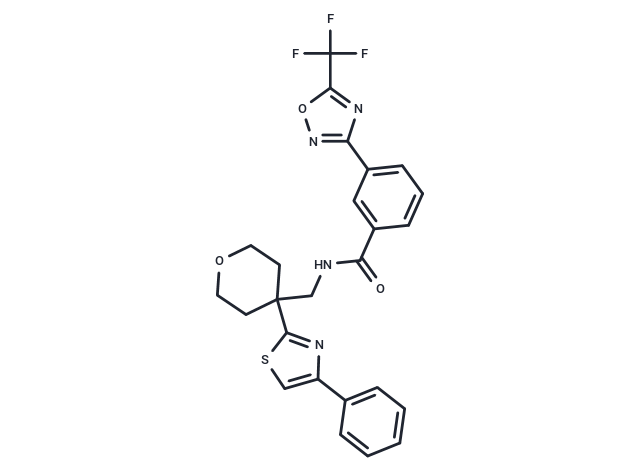Shopping Cart
- Remove All
 Your shopping cart is currently empty
Your shopping cart is currently empty


| Pack Size | Price | Availability | Quantity |
|---|---|---|---|
| 2 mg | $66 | In Stock | |
| 5 mg | $97 | In Stock | |
| 10 mg | $164 | In Stock | |
| 25 mg | $274 | In Stock | |
| 50 mg | $494 | In Stock | |
| 100 mg | $597 | In Stock | |
| 200 mg | $859 | In Stock | |
| 500 mg | $1,290 | In Stock | |
| 1 mL x 10 mM (in DMSO) | $124 | In Stock |
| Description | TMP269 is an effective, specific class IIa HDAC inhibitor for HDAC4 (IC50: 157 nM), HDAC5 (IC50: 97 nM), HDAC7 (IC50: 43 nM), and HDAC9 (IC50: 23 nM), respectively. |
| Targets&IC50 | HDAC5:97 nM, HDAC9:23 nM, HDAC7:43 nM, HDAC4:157 nM |
| In vivo | TMP269 (10 μM) does not affect mitochondrial activity and/or the activity of human CD4+ T cells and can be used to identify endogenous substrates of class IIa HDAC enzymes. In IEC-18 small intestinal epithelial cells, TMP269 inhibits cellular processes, DNA synthesis, and proliferation induced by the activation of G protein-coupled receptor/PKD1 signaling. |
| Kinase Assay | HDAC selectivity assays: Dose-response studies are done with ten concentrations in a threefold dilution series from a maximum final compound concentration of 100 μM in the reaction mixture and are conducted at Reaction Biology Corp. All assays are based on the same principle as the HDAC9 assay described above: the deacetylation of acetylated or trifluoroacetylated lysine residues on fluorogenic peptide substrates by HDAC. HDAC1, HDAC2, HDAC3, HDAC6, HDAC10 and HDAC11 used a substrate based on residues 379-382 of p53 (Arg-His-Lys-Lys(Ac)). For HDAC8, the diacetylated peptide substrate, based on residues 379–382 of p53 (Arg-His-Lys(Ac)-Lys(Ac)), is used. HDAC4, HDAC5, HDAC7 and HDAC9 assays used the class IIa HDAC–specific fluorogenic substrate (Boc-Lys(trifluoroacetyl)-AMC). All reactions are done with 50 μM HDAC substrate in assay buffer (50 mM Tris-HCl, pH 8.0, 137 mM NaCl, 2.7 mM KCl, 1 mM MgCl2, 1 mg/mL BSA) containing 1% DMSO final concentration; incubated for 2 h at 30 °C; and developed with trichostatin A and trypsin. |
| Cell Research | Human CD4+ T cells are isolated from whole blood via negative selection according to manufacturer's instructions (RosetteSep Human CD4+ T cell enrichment kit), re-suspended in T-cell culture medium (10% FBS, 2 mM L-glutamine, 1 mM pyruvate, 10 mM HEPES, 10 U/10 mg penicillin/streptomycin, 0.5% DMSO in RPMI) and plated at 50,000 cells/well with IL-2 (10 BRMP units/mL) and 100,000 human T-expander Dynabeads for 72 h. Determination of mitochondrial function or cell viability is done according to manufacturer's instructions (Cell Proliferation Assay Kit I (MTT)) and is represented as a percent of control (no inhibitor) wells.(Only for Reference) |
| Molecular Weight | 514.52 |
| Formula | C25H21F3N4O3S |
| Cas No. | 1314890-29-3 |
| Storage | Powder: -20°C for 3 years | In solvent: -80°C for 1 year | Shipping with blue ice. | ||||||||||||||||||||||||||||||||||||||||
| Solubility Information | Ethanol: 2 mg/mL (3.88 mM), Heating is recommended. H2O: < 1 mg/mL (insoluble or slightly soluble) DMSO: 93 mg/mL (180.8 mM) | ||||||||||||||||||||||||||||||||||||||||
Solution Preparation Table | |||||||||||||||||||||||||||||||||||||||||
Ethanol/DMSO
DMSO
| |||||||||||||||||||||||||||||||||||||||||

Copyright © 2015-2024 TargetMol Chemicals Inc. All Rights Reserved.